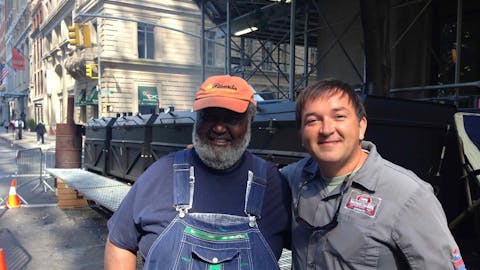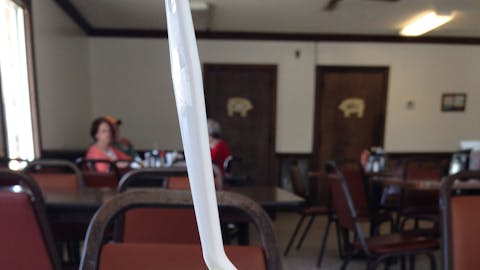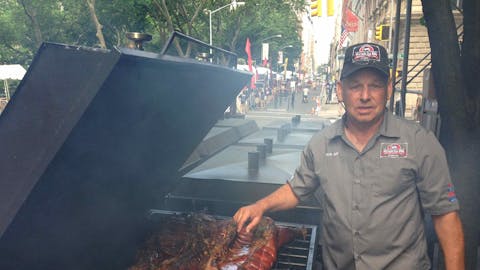
Co-Owner/Pitmaster: Skylight Inn; Opened 1947 in Ayden, North Carolina
Age: 33
Cooker: Direct heat brick pit
Wood: Oak and Hickory
Samuel Jones is part of a North Carolina family that was cooking barbecue back in the nineteenth century. He’s been at the restaurant since birth, and surmises that his mother likely put pig grease in his baby bottles.
Samuel is also a man full of one-liners. When we spoke over the phone, I asked if his day was going well. “There ain’t no bad ones, just some are better than others.” But my favorite line, the one I recite often (with full attribution to Mr. Jones) is “No matter how much mayo you add, you can’t make chicken salad out of chicken s—.”
Thankfully, we’re giving him a little more to work with when he comes to Dallas this Sunday for a whole hog event at Four Corners Brewery. Dia de Los Puercos will feature heritage breed Red Wattle pigs. We hope to see you there to help make Samuel Jones’s first trip to Texas a good one.
Daniel Vaughn: You’re the third generation to work at Skylight Inn, but how far back does barbecue go in your family?
Samuel Jones: Somewhere around the mid-1800’s. I don’t have an exact date. It was my grandfather’s great-great grandfather.
DV: What was his name?
SJ: Skilton M. Dennis. My grandad’s mother was a Dennis.
DV: Where did Skilton live?
SJ: In Ayden, but it didn’t get incorporated until 1890. Prior that it was known as Ottertown, which was random. It’s a lot like the name Skylight Inn. Not a lot of logic there. It just happened.
DV: It’s Ayden now, and it’s out there in Eastern North Carolina. Can you describe Eastern North Carolina barbecue?
SJ: In my mind, it’s whole hog over wood because that’s all we’ve ever done. East of [Highway] 95, that’s the way it’s done. Over time that’s been distorted so that any pork that’s chopped with vinegar is considered barbecue now in a lot of places, but there’s still a handful of old school places that do it like I think it ought to be done.
DV: Are you referring to pork cooked over gas?
SJ: Oh yeah.
DV: In Texas we have gas smokers, but they generally are also fueled with wood. Is that the case in North Carolina?
SJ: That’s the way some places do it, with just gas. They’re taking it to the masses, but they’ve made concessions to do it.
DV: Is that still barbecue?
SJ: That depends on who you’re asking, I reckon. I think it’s cooked pork, not barbecue. I think cooking over wood defines the essence of traditional barbecue. There may be many varieties, but the original definition of barbecue was a whole animal cooked over coals. It was done that way out of necessity once upon a time. That was the only method of cooking. I personally think you can’t recreate what happens when you cook a whole animal over wood. Even a cut of brisket. If you cook it any other way, there’s nothing you can do to make up the ground you lost.
DV: What kind of wood do you cook on in North Carolina?
SJ: We use a mix of oak and hickory, but it’s predominantly oak here at Skylight. That’s what is abundant here. In Western North Carolina hickory is the big thing because there’s a lot of it. Then you go back not too long ago you didn’t have people spinning yarns about what this strand of wood does, or this particular cut of meat. People used what was in their area. I don’t think my grandfather would have thought about shipping any wood in from any parts west fifty years ago. Fast-forward to present day, and oak is what defines the flavor of Skylight.
DV: At the event in Dallas we’re cooking heritage hogs, but you normally cook with commodity hogs. Are there challenges cooking leaner hogs, or does it work to your advantage?
SJ: The Lord intended for them to make lard and sausage, not just to be cooked whole. There are some breeds that are the perfect balance, but you can have too much fat. We use farm raised hogs here at the store when available. And when I say “available,” I mean when I can get them for close to what I pay for my usual hogs.
DV: How much do you normally pay for hogs at the restaurant?
SJ: If you’re buying commodity pigs, you can get them for around $1.38 per pound. Occasionally, I can get a truck load of sows raised on dirt for maybe ten more cents per pound. That’s not traumatic on our bottom line.
DV: What do you charge for barbecue at Skylight Inn?
SJ: We sell it by the tray, not the plate. Our medium tray is eight ounces of pork, a side of cornbread, cole slaw, and a drink will cost you right around $9.

DV: That sounds like a good deal.
SJ: I think so, but some people think we’re robbing them.
DV: And you need that $1.38 per pound hog to be able to charge that little, right?
SJ: Yes. The way I try to explain to be people is this. We’re not bad business people, but we don’t want to have to stop anything we’re doing behind the scenes. I don’t want to stop cooking with wood to give you a cheaper product. I don’t want to stop cooking whole hogs. See what I’m saying?
DV: Would just cooking shoulders be better for your bottom line?
SJ: I think it would be more profitable, but you’re going to lose something from that.
DV: That would be like cooking in the Piedmont [the Western side of North Carolina].
SJ: They make a living doing it their way, and we make one doing it our way.
DV: Between barbecue fans on each side of the state, there seems to be a genuine rivalry between the west and the east.
SJ: Oh yeah. They just want you to go to dukes over that.
DV: Do the people who cook it for a living have those same arguments?
SJ: I don’t think so. I don’t anyway. I’m not one of those people that’ll tell you that our way is the only way and that if you don’t do it our way you’re going to hell. Barbecue is defined by geography. In North Carolina it really changes by community. Do what you do and do it with the passion that ought to be in there, and you should be proud of the product you turn out. If you’re half-assing it you know you ought not walk to the forefront with your chest out.
DV: You didn’t much like the idea of going to work in barbecue when you were younger. Didn’t you go to college?
SJ: When you find something you’re good at and you find your stride, you just roll with it. I went to school and I stayed out a semester when my grandfather’s health went bad. I had the intention of just staying out that one semester, but I never went back.
DV: Who taught you how to barbecue?
SJ: It was a collaboration between my grandfather and [Uncle] Jeff .

DV: Let’s switch gears. You’re coming to Dallas to cook whole hog this weekend. How many times have you been to Texas?
SJ: Zero.
DV: First time. Have you ever had Texas-style barbecue?
SJ: Yes. I liked it, but then I’m a lover of all smoked meats.
DV: Same here. That’s why we’re bringing you to Dallas. Just so I don’t have to go all the way to North Carolina.
SJ: That’s one way to do it.
DV: What should people expect from this whole hog?
SJ: It’s gonna be different. I don’t expect to go there like an evangelist and try to convert everyone, but if someone came to Greenville, North Carolina that did phenomenal brisket, I think the people there would be overjoyed.
DV: Can you describe your method for hog?
SJ: A whole animal, salt, and hot coals. It’s simple, but then you stretch that out over about sixteen hours.
DV: How do you serve the meat?
SJ: It’s chopped with simple seasoning. There’s salt, black pepper, vinegar and a little hot sauce. You don’t spend sixteen hours cooking to wrap it up in any particular brand of barbecue sauce.







